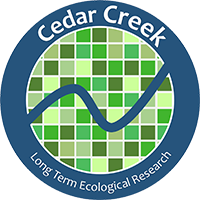Our overall research goal is to use long-term observations and experiments, theory, and models to achieve a mechanistic and predictive understanding of:
- how ecological systems will respond to interacting human-driven environmental changes at multiple biological, spatial, and temporal scales and
- how ecological responses feed back to moderate or amplify environmental changes and alter the ecosystem services that support human well-being.
Four interrelated themes tie together the research at CDR
Theme 1. Discovering how multiple interacting environmental change factors impact ecological systems.Concurrent global changes to climate, resources (e.g., CO2, N, or P), disturbance (e.g., fire and changes in land use), and biodiversity (e.g., invasions and extirpations) are impacting ecosystems. Because these multiple drivers of ecological transformation interact in complex ways that may dampen or exacerbate their individual effects, developing a mechanistic understanding of how these changes affect organisms, populations, communities, and ecosystems requires long-term experiments that simultaneously manipulate multiple factors. Theme 2. Discovering how inter-related components of biodiversity (species, phylogenetic, trophic, and functional groups and traits) determine ecological responses to environmental change.Interacting environmental global change drivers act across a range of scales of biological organization, including organisms, populations, communities, and ecosystems. At CDR, in addition to explicitly considering diversity as one of the drivers of ecosystem change (Theme 1), we consider diversity as a key component of most if not all of the attributes of ecosystems that respond to, and interact with, drivers of change to collectively determine processes across scales. Among ecological attributes, we consider composition across scales (e.g., trait values at the organism scale, genotype at the population scale, species identities and trophic position at community and ecosystem scales) as an explicit component of “diversity”. |
Theme 3. Discovering how biotic interactions and feedbacks in ecosystems influence long-term ecological responses to environmental change.At the core of the LTER mission is the recognition that short-term ecological responses to environmental drivers may represent transient dynamics that differ in strength or even direction from long-term responses. Long-term multi-factor experiments often reveal interactions among global change drivers not apparent until well beyond a normal three-year funding cycle. Following perturbation, ecological systems may be slow to equilibrate (e.g., because of slow individual or population growth rates), exhibit delayed response (e.g., because of dispersal limitation or storage of excess nutrients, experience feedbacks that dampen or accelerate change (e.g., because of species-induced changes in availability of limiting resources, or show variable response over time (e.g., caused by stochastic environmental variation. For all of these reasons, ecological responses are best elucidated with long-term experiments and observations that manipulate interacting environmental change drivers that occur at varying timescales and with varying dynamics. Theme 4. Discovering general insights through synthesis, cross-site studies, theory, and modeling.Empirical research is most powerful in advancing understanding when it (1) is informed by and used to develop and test; (2) informs predictive modeling; and (3) is included in synthetic analyses and cross-site studies to reveal general principles. Research at CDR combines theory, models, and empirical syntheses with place-based data to test the generality of relationships and processes revealed at our site (Themes 1, 2, and 3) and others to allow CDR findings to contribute more fully to understanding our changing world Theme 4). |
